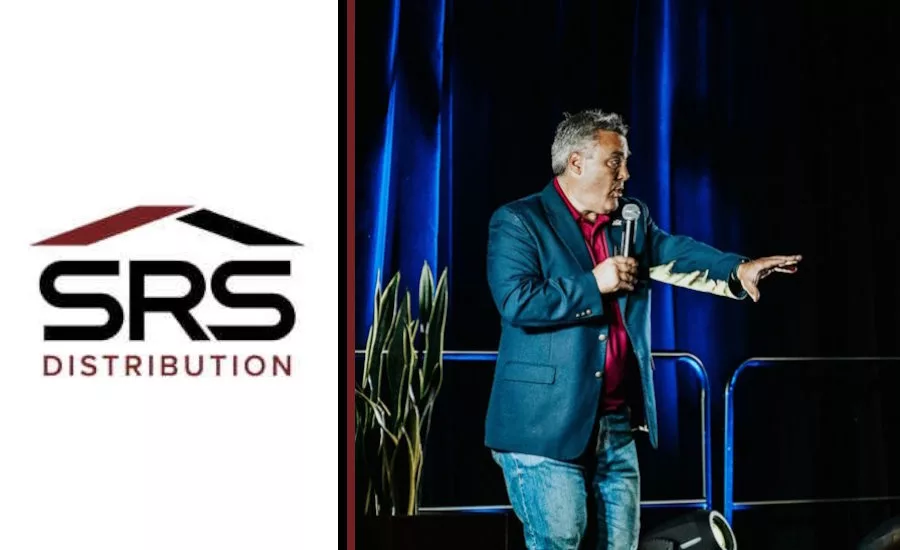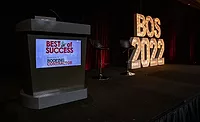Distributor Profile
Leading Contractors to Success: John DeRosa, SRS Distribution
Director of Contractor Training & Business Development draws on more than 25 years of experience and knowledge to help contractors maximize their potential

Photos courtesy of John DeRosa.
In movies and TV shows, the main character often receives sage advice from a mentor or trainer that eventually helps them become the hero. The hero will thank them, but the mentor reminds them that it was they who unlocked their own potential.
So it is, like Obi-Won Kenobi to Luke Skywalker, or Mr. Miyagi to Daniel LaRusso—the “Karate Kid,” John DeRosa helps customers maximize their opportunities as SRS Distribution’s director of Contractor Training & Business Development.
His wealth of knowledge is a healthy mix of learned experiences and important lessons drawn from businessmen and educators like Stephen Covey and books like “The Challenger Sale: Taking Control of the Customer Conversation,” by Brent Adamson and Matthew Dixon.
“I just want the good guys to win, and that's what I'm all about,” DeRosa said. “If you're not buying from my branch or my company, and you want to just have a conversation with me, of course, I want to talk to you; of course, I’m going to try to help you.”
The Mentor’s Journey
DeRosa’s path to distribution started on a different note – a musical one, in fact. He attended music school after high school, though, as he puts it, he “left an area where I was a really big fish in a small pond and then went out and realized that I was this really tiny minnow in this huge world of sharks.”
He left music school and instead earned a bachelor’s degree in business administration. He then took his newfound acumen to a job with a wholesale distributor in the northeast U.S., selling windows and millwork. While there, he encountered staggering statistics about the large number of contractors who go out of business in the first three to five years.
“I remember thinking, man, if my customer who was a lumber and building material dealer every year has to go out and replenish their customer base, that's a huge cost,” he said. “I created a program called the ‘Contractor Survival Program,’ which was a four-week program.”
The program addressed pricing, marketing and sales and was geared toward helping customers combine those aspects to generate success. It was well received, leading to window manufacturers wanting to learn more. Around this time, a roofing distributor and manufacturer called him up about joining their organization.
He wasn’t about to turn down an opportunity, realizing roofers could use the same information. To his delight, the industry was full of people looking to collaborate, including SRS Distribution.
In the early 2000s, DeRosa traveled the nation on behalf of the manufacturer he worked for, introducing him to distributors and suppliers. He recalled a meeting with Dan Tinker, president and CEO of SRS, and a banner behind Tinker that displayed all of the companies SRS had acquired at the time.

“As I was scrolling over the brands, I was like, ‘Oh my gosh, I know these people,’” he said. “I remember just being genuinely impressed at the quality of people and how they are just so passionate about helping customers, and that was really powerful.”
It was so powerful that DeRosa reached out to Tinker – having been familiar with each other through their business dealings – about joining the distributor.
“It’s quite honestly been one of the best decisions. My only regret is not being smart enough to do it sooner,” he said with a chuckle.
He and Tinker created a position where DeRosa could do what he did best: work with contractors. DeRosa said joining SRS liberated him. With the distributor offering multiple brands and product types, DeRosa could train contractors without worrying if they were loyal to a particular manufacturer.
“I felt if I could join distribution, I could say, ‘Hey, look, you could buy whatever stuff you want to buy and I'll support all those brands, but let's help you guys win.’ And it's kind of been history ever since,” he said.
He notes that his situation isn’t entirely unique in SRS. He said the company has an entrepreneurial spirit and works with employees to help them achieve their professional goals.
“People are empowered to make the decisions that they think are in the best interest of not only the customer, but also the organization as a whole,” he said. “Our business model is ‘make money, have fun and give back,’ and I think we're all passionate about all of those things.”
Empowering Customers
Based in a suburb of Buffalo, N.Y., DeRosa travels the country on SRS’ behalf to train its customers, developing programs like How Gross Is Your Net?, Sales Dynamics for Contractors and The Sales Acceleration Program.
When the COVID-19 pandemic shut down in-person interactions, DeRosa pivoted to video meetings. In a way, though, the pandemic provided a solution for one of his challenges: only having so much time in a day.
“People became more comfortable with the idea of jumping on a Zoom call and have a conversation,” he said. “It's just as good and just as valuable, I hope, as if we were to do it live.”
DeRosa faces a fundamental challenge regardless of whether those conversations are in person or over video. He is meeting with contractors to inspire changes. To do that, he must balance respecting their operations while pointing out areas of improvement.
“I've got to get in people's ‘houses’ and kind of shake it up a little bit and say, ‘You're dropping the ball, you need to do something different,’ but I need to do that in a way that respects the relationship,” he said.
He credits customers for viewing him more as a consultant than an SRS representative, leading to positive interactions. DeRosa said the most satisfying part of his job is hearing from customers who took action based on the advice he gave and are finding success.
“I do get people periodically that'll reach out to me and say, ‘Hey, I went out and I sold a big deal today and it was because of you.’ And as much as I enjoy that, I love to be able to tell them that ‘It wasn't me. It was you. You took the action. You made it happen. You took the information, which is all I provided, and you figured out a way to make it work for you.’”
At 56, DeRosa said one of the areas that has changed the most over time is technology. When speaking with contractors, he finds that they are often overwhelmed, having to wear multiple hats to run their businesses. His training encourages customers to streamline their operations with technology, which often helps them achieve their goals of scaling their businesses.
Returning to his earlier point of shaking things up, DeRosa said talking about tech is about demonstrating to companies that they might be successful now but can achieve more if they take action.
“They're so wrapped up in the noise of urgency, that they're not really looking at what are the different opportunities that I have to reduce some of that stress, and allow me to really love my business better?” he said.
DeRosa doesn’t limit his education to customers. He is a frequent presenter at the International Roofing Expo, saying he enjoys putting information out there that people can use. There is the hope that customers will do business with SRS as a result, but DeRosa doesn’t view it as a quid pro quo situation.
“I'll get up in front of a group and people, just give them all the content that I have, won’t mention SRS at all. I'll wear the shirt, but it's all about them. And then hopefully, they see that as valuable,” he said.
Proof of this is found in an anecdote DeRosa recalled from a previous International Roofing Expo. Around five years ago, an attendee spoke with him, saying his father sat in on a presentation DeRosa held around 20 years ago on Long Island. The man said his father told him to tell DeRosa ‘thank you’ on his behalf, saying the information helped change his business.
“If I get to define what my legacy would be — on the business world side — it would just be the ability to impact people or get people motivated to try something different, and then enjoy a higher level of success because of it. Bar none. That's one of the greatest feelings,” he said.
In his non-professional life, however, his legacy is being there for his family. His children are active in sports, and the family enjoys going on vacations when able. DeRosa said it comes down to keeping your focus when asked about work-life balance.
“I love my job, and I want to work my butt off and do everything I can. And then when I'm with my family, I try to make sure that I'm 100% invested in them at that point in time,” he said.
Looking for a reprint of this article?
From high-res PDFs to custom plaques, order your copy today!










